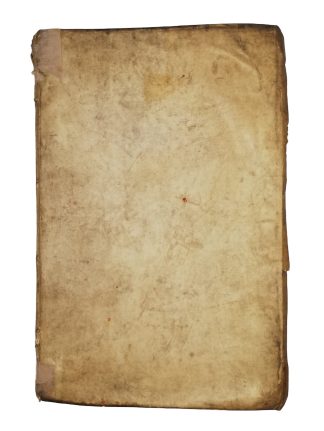CASTRO, Rodrigo.
THE WORLD OF WOMEN
£3,750.00
CASTRO, Rodrigo. De universa mulierum… Pars prima Theorica.
Hamburg, in Officina Frobeniana, 1604.
CASTRO, Rodrigo. De universa mulierum… Pars secunda, sive Praxis.
Hamburg, in Officina Frobeniana, 1603.
Second work FIRST EDITION. 2 parts in one vol. Folio. Pp. (xii) 135 (xxi); Pp. (xiii) 333 (xxiii). Roman letter. Castro’s arms engraved on both tps, ornamental head and tail pieces and initials. Early monogram ms to first tp ‘KARS’ within laurel, contemp. autograph J.Eekkems crossed out above. Light age yellowing, tear to blank fep, light water stain to a few leaves at head, very occasional minor ink and rust spots, repair to blank verso of second tp. A good clean copy in contemp. vellum, dust soiling to covers, loss to head and foot of spine and upper corners of lower cover.
Handsome collection of the 1604 reissue (Pars prima) and the 1603 first edition (Pars secunda) of this hugely important gynaecological treatise by Rodrigo de Castro (c. 1546-1627/29). Part one discusses the anatomy of the uterus and breasts; semen and menses; coitus; conception and pregnancy; labour and breastfeeding, and part two discusses various female diseases, including those allegedly particular to widows and virgins, issues with pregnancy and child birth as well as the health of wet nurses.
Rodrigo de Castro Lusitano was a Jewish-Portuguese physician who moved to Hamburg in 1594 to escape anti-Semitic persecution. He studied at Salamanca and was then asked by Philip II of Spain to go to India and select medicinal plants to bring to Spain; though Castro refused on health grounds. De Castro’s wife died in 1603, leaving him alone with young children. The same year the present work was published. This forms the first treatise on gynaecology written by a Portuguese author, combining acute medical and anatomical observations with contemporary opinions on women and superstitious beliefs in monstrous beings. De Castro provides a list of medicines to be administered for avoiding a pregnancy likely to result in birthing a monster.
The work makes extensive reference to ancient medical texts, classical and Arabic, including Hippocrates, Aristotle, Pliny, Soranus, Galen Averroes and Avicenna. De Castro combines this with considerable interaction with contemporary European authors like Mercado, Paré and Rousset. Pregnancy and child birth was predominantly attended to by midwives, not doctors, in this era, yet de Castro describes many ailments and treatments in detail, including a massage that should be given to encourage child birth, as well as recommending the presence of the husband, which was unheard of at the time. Semen and menstrual blood is discussed in detail. De Castro believed women had semen and that it was, to an extent, animate. He also believed menstrual blood nourished the child in the womb and that it was not, contrary to common opinion, hotter than man’s blood.
Wellcome 1361; BMC 17th C378 & 379; NLM has second title only; Not in Osler, Heirs of Hippocrates, or Garrison Morton.







